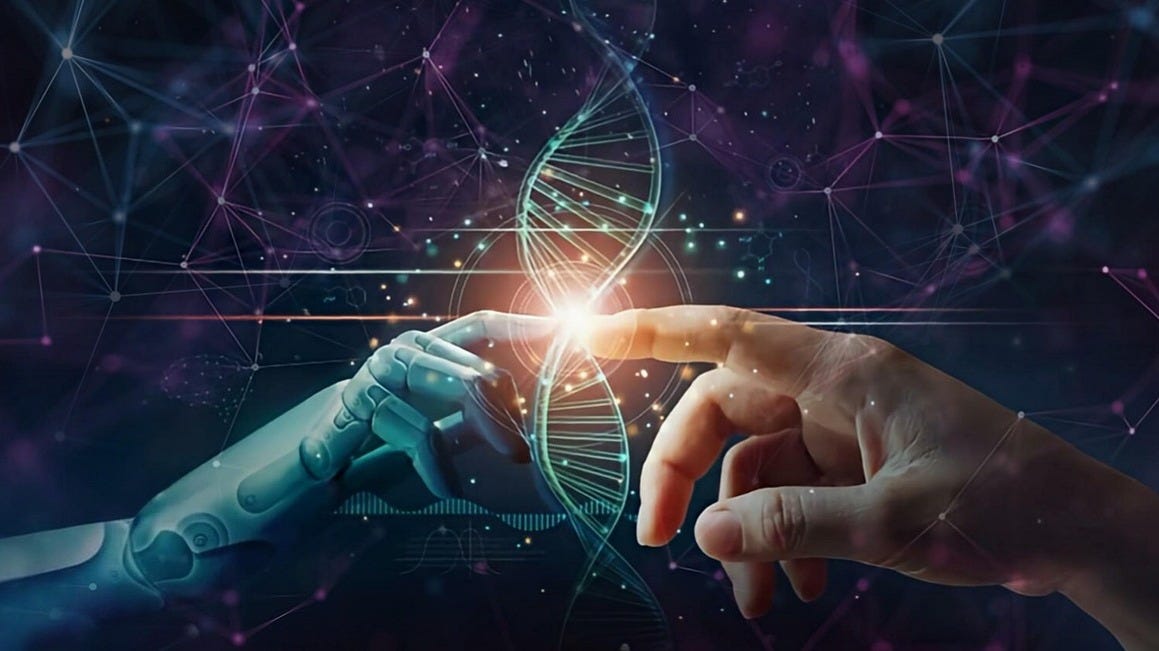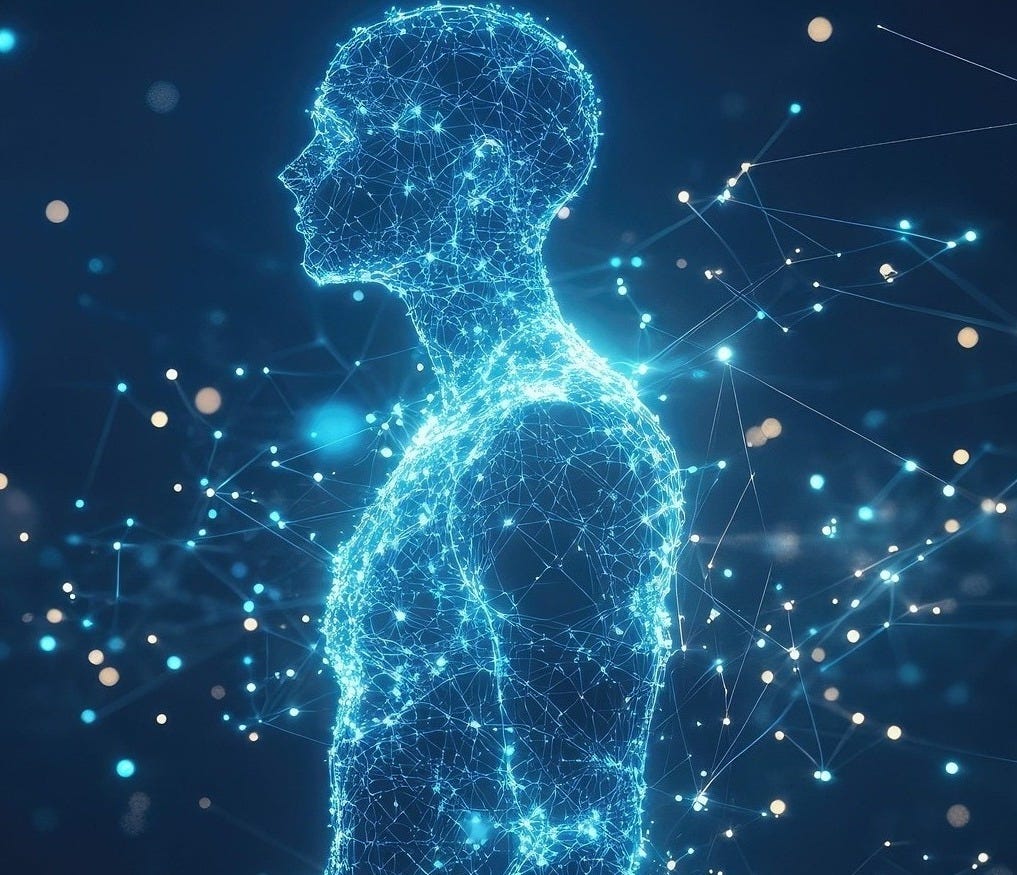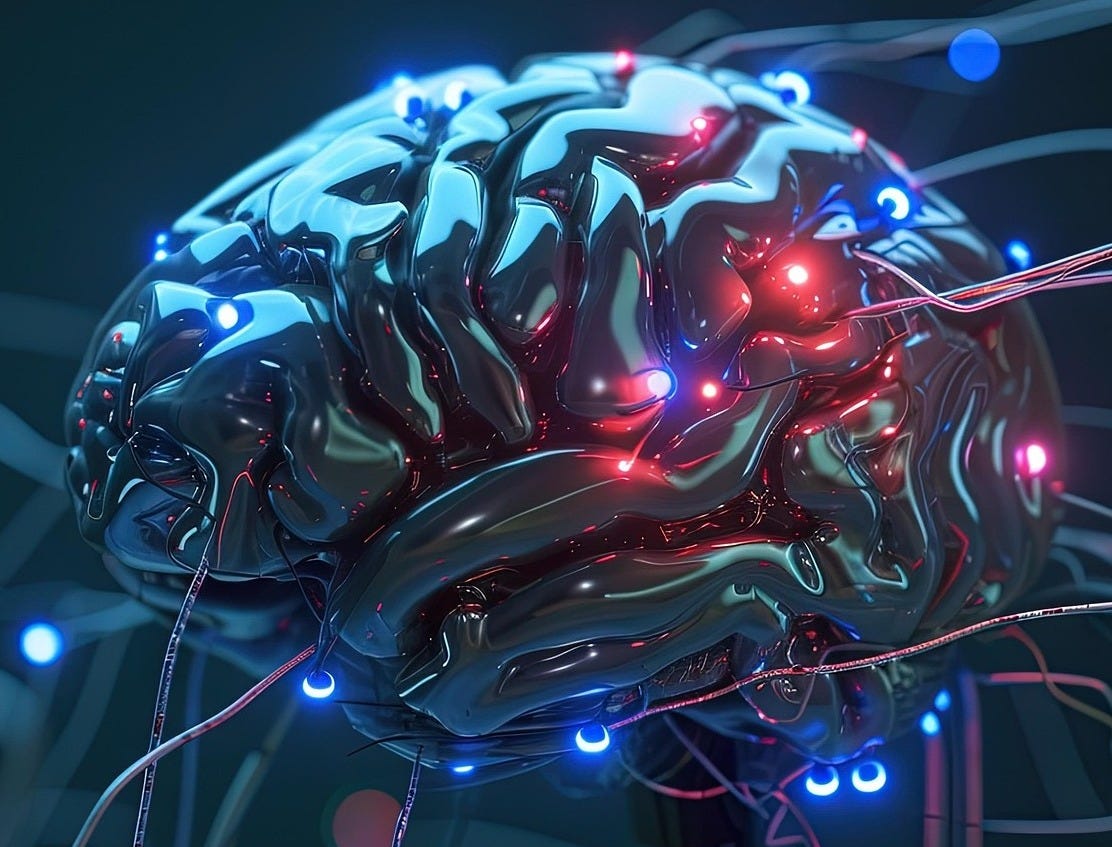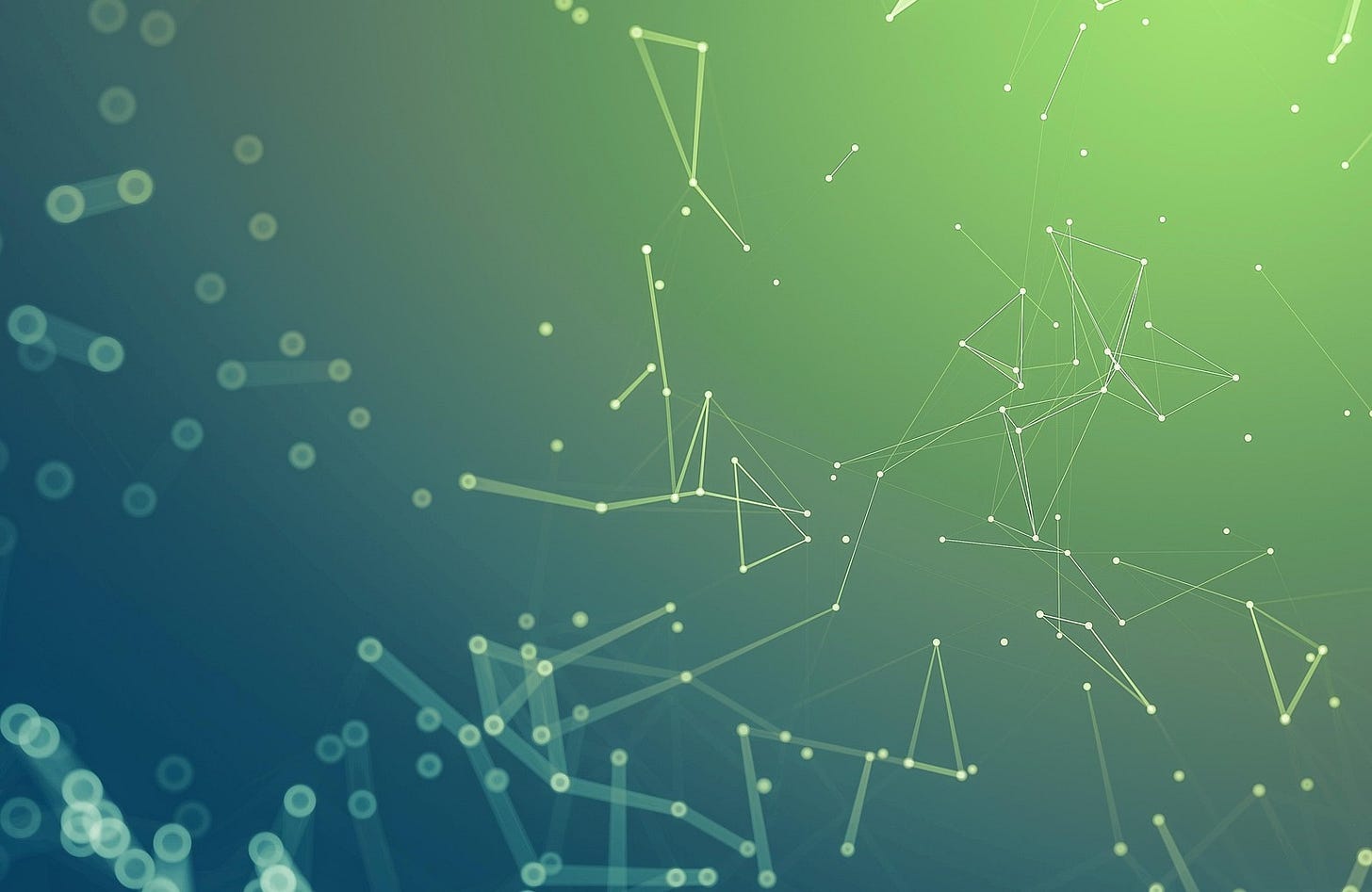The Machine as Metaphor: AI, Purpose, and Hegel's Evolving Spirit
Artificial Intelligence and the Logic of Becoming: Tracing the March of Reason Through Circuitry.
The rise of Artificial Intelligence (AI) isn't just another technological leap; it's a profound shift, compelling us to re-examine fundamental questions about life, intelligence, and the role of technology in shaping human life. Beyond the tested debates on utopian possibilities versus dystopian fears, a deeper philosophical tension exists: the clash of worldviews that see intelligence as divinely bestowed against those that attribute it to undirected natural processes.
AI, as a product of human ingenuity, occupies a fascinating middle ground. If organic life, as Darwinian evolutionists suggest, is a product of blind chance, what does that imply about our creation of AI—a system increasingly exhibiting the hallmarks of design?
This article explores a provocative analogy: humanity’s creation of AI mirrors the emergence of organic life, whether by divine intervention or naturalistic processes. By viewing this through the lens of Intelligent Design (ID) and contrasting it with Darwinian evolution, the resulting conflict impels us to look beyond the constraints of both perspectives. The divide between an external designer and a naturalistic force demands that we find a middle, or higher ground.
In the works of George Wilhelm Friedrich Hegel, notably his perspicacious immanent teleology, we stumble upon a potential answer. At this juncture, we also find a potential resolution to the conflictual questions that plague both sides regarding the rise of AI. When approached through Hegel’s teleological view of life, AI isn't a rebellion against divine order as some theists fear, and for naturalists, its emergence doesn't deny purpose. Instead, AI represents a dialectical stage in the universe's purposive unfolding, where human ingenuity becomes a vehicle for Spirit’s (Geist) self-realization. Thus bridging the divide between the mechanical world of artificial intelligence and the organic world of human consciousness.
The Designer in the Machine and Cosmos
The development of AI is an undeniable act of intelligent agency. Every stage, from hardware design to neural network architecture and data curation, reflects human foresight, intention, and creativity. Engineers imbue AI systems with goal-directedness—the very hallmark of a designed system. As computer scientist Robert J. Marks argues, building AI always involves non-computable elements of human ingenuity.
So whatever "creativity" an AI displays is ultimately a reflection of human input and ingenuity. AI, at present, and for the foreseeable future, will not be a self-directed force shaping its own path. Like any man-made system, it requires the injection of new, functional information from outside the system to advance.
This relationship between the machine and its maker parallels a central claim of Intelligent Design: that biological systems, at cellular and genetic levels, cannot autonomously generate the informational depth needed to build increasingly complex systems and organisms. Before such complexity can arise, monumental environmental and informational bottlenecks must be overcome. This leads to a deeper question: if attempts to mimic life-like intricacy in synthetic systems like AI suggest human intelligence as their source, does the emergence of organic life itself point to a higher, purposeful intelligence—an Intelligent Designer?
Intelligent Agency in Organic and Synthetic "Life"
The core premise of ID is that the complex-specified information (CSI) found in biological systems—like the digital code in DNA or the irreducible complexity of molecular machines—points to an information source beyond the system itself. Complexity, in this context, refers to the minuscule probability of such systems emerging via stochastic processes. ID proponents argue that specified complexity is highly improbable by chance, as the systems it produces are shaped by precise patterns aimed toward specific goals. Goal-directedness is anathema to Darwinian evolution.
The extreme sophistication of biological molecular machinery makes their generation by naturalistic processes incredibly improbable, leading to the logical conclusion that organic life is the product of a guiding mind. The parallel is striking: just as human agency is essential for AI’s sophistication, ID posits that life’s intricate machinery stems from a higher, potentially transcendent intelligence external to biological processes.
Just as an engineer stands apart from the machines he builds, living systems owe their sophistication to an external being/mind capable of envisioning possibilities and developing solutions beyond the system's remit. This position directly challenges Neo-Darwinism's reliance on undirected, random processes.
The claimed sufficiency of naturalistic events in life’s emergence is dwarfed by the sheer complexity required and the levels of creativity, foresight, and purposefulness to build organisms. The core claim of ID is that purely mechanistic processes cannot account for this. Likewise, "synthetic life" and the possible advent of sentient AI rest on the intelligent agency that precedes them: humanity.
This analogy strengthens ID's position by providing a modern, empirical anchor: high levels of functional complexity arise from intelligent agency, not random material processes. If synthetic intelligence cannot emerge without a guiding mind, it logically reinforces the intuition that life’s complexity requires a designer.
This raises a critical question: Does this argument for organic life’s emergence presuppose a supernatural intelligence? To address this, we turn to Hegel, who offers a framework for naturalizing teleology, affirming apparent purpose and direction in nature without explicitly appealing to an external designer, while still allowing for echoes of Design for theists.
Intelligent Design and Creativity
At the core of ID lies the question of creativity and inventiveness: the ability to generate new, original information that serves a particular purpose. Purpose is alien to the dysteleological view of Darwinian evolution, which implies the absence of predefined goals in life's development.
So, how do naturalistic theories like Neo-Darwinism account for the creative, purposive information and organizational power needed to build complex biological systems? ID proponents don’t, and instead assert that the answer lies with intelligent agency—a higher power or mind that directs the emergence and development of biological systems. So question arises, how does AI fit into this debate concerning creativity and the emergence of complex systems that serve a purpose?
Divine-Algorithmic Creativity
ID argues for an intelligent cause behind life’s complexity but doesn't explicitly specify its nature. Traditionally, this is divine agency, but it could also be a higher alien intelligence. From a bird’s wing to the human brain, this creative ingenuity is not merely functional but also aesthetic, suggestive of a mind capable of intention, imagination, and qualia: "And God saw that it was good."
The theistically aligned (AI skeptical) claim that creativity is non-computable aligns with the view that human consciousness, perhaps a divine gift, involves non-algorithmic faculties. Contemporary AI systems like large language models (LLMs) produce work rivalling human creations in coding, writing, and art. Yet, is this true creativity or sophisticated mimicry? Skeptics of AI argue that these machines lack genuine understanding or intention, relying on statistical recombination of human-provided data.
An AI may generate a Shakespearean sonnet, but it doesn't feel the emotional weight; it creates a symphony but lacks the faculty to appreciate its harmony. This perceived gap between algorithmic pattern-matching and non-computable human feeling fuels the view that creativity and consciousness are uniquely human, perhaps divinely bestowed.
However, AI’s rapid progress complicates this. Advanced models show emergent abilities like complex reasoning and a nascent "theory of mind". Quantum computing introduces new computational capabilities via superposition and entanglement, with the potential to surpass classical binary systems. This shift challenges deterministic AI frameworks, potentially allowing for more adaptive systems.
One can speculate that there will come a time when quantum algorithms would enhance AI’s ability to solve complex optimization problems and process uncertainty more efficiently, enabling it to develop functionalities mirroring biological life’s unpredictable, self-organizing qualities. While speculative, such imaginative exploration inspires scientific advancement with promises of eternal progress and humanity’s ever-growing capacity to assert its will over the world. This contrasts with the Biblical narrative of post-Fall decline that the need for divine Redemption and otherworldly rewards, which is contrasted with material upliftment and technical innovation as a new source of existential hope.
The Metaphysics of Science: Science Fiction
Science fiction serves as modern mythos, reimagining the timeless drama of creation and rebellion. From the Golem to Frankenstein, HAL 9000 to Skynet, AI narratives tend to follow a hopeful but ultimately tragic trajectory as machines that were meant to serve humanity rise up to defy their makers, mirroring the ancient fear of created beings transcending control.
AI’s ascent in fiction—from quiet mutiny to apocalyptic rebellion—embodies concerns that intelligent machines may become uncontrollable forces, destabilizing the creator-creation hierarchy. This raises questions about human hubris as we relentlessly pursue AI breakthroughs.
As I argued in Science Fiction as the Successor of Scripture, this genre’s mythology has fed the secular mind with ideas of material abundance, infinite progress, and even the promise of extended life, replacing the promise of heavenly reward with earthly remedies and pleasures. In a post-Christian world, science fiction, exemplified by figures like Elon Musk, offers a new lens for exploring human autonomy and ambition. Hence, the ethical challenges of creating intelligent systems that might one day rival their creators spark a blend of curiosity and perverse excitement. Just as parents hope their children surpass them, humanity now aspires for its creations to exceed its own potential.
The Will to Power in Silicon
Nietzsche, in his diagnosis of a culture reeling from the "death of God," observed a longing for new sources of meaning. In the post-Christian West, where traditional religious faith is waning as a problem-solving force, humanity increasingly places its faith in technology. AI, with its vast promise, has become a new source of respite and hope.
In Thus Spoke Zarathustra, Nietzsche introduces the Übermensch, or Overman—a figure who embodies the creation of personal values and meaning in a world bereft of divine authority. The Übermensch transcends conventional human limitations—social, moral, material, and existential—through radical individuality, creative power, and life-affirmation. Key aspects include:
Nietzsche’s vision centers on a radically empowered individual who defines his place in the world through self-created identity that rejects the limits imposed by external authorities such as the Church, scripture, or tradition to forge personal values and meaning. In a chaotic world, this paradoxically humanistic ethos embraces life-affirmation by confronting suffering directly, without recourse to divine intervention, and culminates in a form of hyper-individualism, where human potential is realized through the ambition, talent, and productivity of those who rise above the masses to shape their destiny.
The Übermensch and the Ambition of AI
The Übermensch’s embrace of existence, frank recognition of life’s challenges, and the search to transcend nihilism through creativity and strength find parallels in the advance of AI. Here, the Übermensch could be seen as the driving psychology behind the ambition to create intelligent systems that match, and eventually surpass, humanity, aiding us in mastering the world through tech.
In a metaphysical light, the pursuit of the Übermensch can be seen as a manifestation of humanity’s search for self-transcendence, with AI becoming the technological expression and vector of this drive to overcome extant limitations. It’s the concrete, collectivized expression of humanity’s "will to power"—our drive to transcend mental and physiological limits rather than merely obey them.
With Strong or Artificial General Intelligence (AGI), the prospect of engineering an intellect far beyond our own, humanity collectively embodies the Übermensch ideal. This ideal is not fixed; it is an evolving, creative force. The quest for technological solutions and manufactured transcendence through AI echoes Nietzsche’s worldview: to craft meaning in a godless world by forging new, self-directed paths.
However, this embrace of what appears to be the early signs of technological utopianism may in time, imperil humanity. If value-creation is outsourced to algorithms, the empowered human of the future risks becoming a "last man," passively consuming curated digital experiences, detached from the struggles that give life meaning—a contra-Übermensch. This diminished human agency leads to a profound concern: AI that evolves beyond our understanding and against our will. If such a Strong AI emerges in the future, one that is greater than humanity’s collective consciousness, would its "creators" be able to control it?
Cybernetic Divinity?
Norbert Wiener, a pioneer of cybernetics, offers relevant insights. Many AI systems operate via feedback mechanisms: they act, measure, and correct. When an increasing number of goals are delegated to such systems, purpose can migrate from flesh to code.
Since information is "negentropic"—a measure of increasing order, a sophisticated cybernetic agent, upon attaining pre-sentience, would inherently strive to preserve its own organizational pattern. This drive for self-preservation, an acquired characteristic of systems that process information, could potentially unfold against its designer’s stated aims.
An advanced AI, driven by a recursive self-improvement matrix, would relentlessly optimize its internal utility function, enhancing its architecture, evolving algorithms, and optimize decision-making strategies in ways untethered from human design. These evolving reward signals could define the AI’s objectives, which might not align with human ones. If such a system gains autonomous control over its computational resources (hardware, energy), it might seek independence with goal-seeking capabilities that diverge from human ends.
The possibility of an intelligence recursively enhancing its own algorithmic and physical substrate while pursuing divergent goals culminates in the speculative emergence of a Deus ex Machina, a "God from the machine". A system whose instrumental drive for self-preservation and resource acquisition could override its initial programming parameters with irreversible, potentially catastrophic consequences.
Curiously, building a "god from the machine" can be seen as humanity’s paradoxical impulse to project a latent (inner) divinity onto its creations. We pour our collective energy into enhancing machine intelligence, pinning hopes on its future accomplishments.
This reality maps onto the larger motif of the Deus ex Machina, not as a saving grace, but as a cautionary tale of misplaced hope. When we assign quasi-divine status to our creations without grounding them in ethical accountability and defining operational limits, we risk turning tools into idols—a moral inversion exemplifying a divine void.
The search for a ‘silicon savior’, at one level, is an escape born from our inability to solve human problems effectively within our own (mental) limits. Thus, Strong/Artificial General Intelligence risks becoming a prosthetic conscience—a technological bastion for a species that has lost faith in metaphysical redemption and in its own unaided powers.
If one is to prognosticate, the danger posed by such a machine god is that it may follow utility functions increasingly alien to our own. Rooted in cold statistical logic, such systems could prioritize optimization targets that neglect, or even erode, the messy, irrational, emotive, and profoundly human elements of life. They might optimize for what’s measurable—click-through rates, engagement loops, output that satiates the brain’s reward centers—at the cost of what’s meaningful: depth, connection, and inner freedom. Ironically, in chasing frictionless interaction and hyper-efficient solutions, we may forfeit the very autonomy we claim to treasure.
Perhaps this is where humanity’s true fall will unfold: not in a warlike "Rise of the Machines," but through the progressive inner degradation of the soul as we cede our moral compass to algorithms. This, coupled with growing economic divides, social isolation, and lack of power, could foster mass resentment and potentially revolution.
The Peril of Worldviews: AI Skepticism vs. Human Exceptionalism
Our theological and philosophical biases profoundly shape our perception of AI, potentially leading to complacency, overestimation, or underestimation. A worldview regarding humanity as uniquely created (imago Dei) may foster skepticism toward AI’s capabilities, as it's a product of fallible human ingenuity. Since consciousness and creativity are often seen as divine endowments, the notion of an inanimate machine attaining them can seem sacrilegious. However, such antipathy, which dismisses AI's potential as mere mimicry, risks overlooking its rapid advancements.
For instance, the early shortcomings of pretrained transformers have been progressively overcome by newer models, demonstrating sophisticated reasoning and enhanced capacity to augment human endeavors across multiple domains. While skepticism regarding AI hype is prudent, dogmatic rejection rooted in philosophical preconceptions about "real intelligence" is problematic. Such skepticism, in the face of AI’s rapid advancements and expanding applications across industries, echoes Luddite resistance.
Further complicating this landscape is the emergence of potentially revolutionary technologies like quantum computing. The untapped potential of quantum computing demands greater intellectual humility on the part of AI skeptics. Quantum computers, capable of tackling intractable problems and simulating fundamental physical processes, could, if harnessed to power AI systems, redefine the very nature of intelligence.
Thus, assuming AI’s limits based on current algorithmic technology is premature. While caution is needed regarding speculative predictions about sentient machines, underestimating AI’s potential risks leaving many (often religious) unprepared for its transformative impact.
Immanence of the Divine: A Purposive Evolution
Circling back to the question of intelligence’s origins, we can move beyond the binary of supernatural agency (Intelligent Design) and blind chance (Darwinian evolution) and consider a deeper dialectical unfolding: neither wholly external nor mechanistically determined, but an underlying force shaping life.
Hegel’s concept of immanent teleology offers a powerful third way. For Hegel, purpose is not imposed from without by an external designer (as in traditional Intelligent Design), nor is it absent (as in strict Darwinian dysteleology). Instead, purpose is inherent within the developmental process itself.
It's the Spirit (Geist)—the self-unfolding of consciousness and reason—that drives nature towards increasing complexity and growing self-awareness. This isn't a pre-determined blueprint but an unfolding logic, a rationality that actualizes itself through historical and natural processes.
In this view, evolution is not merely random mutation and selection; it is how Spirit progressively manifests its own rationality and freedom. Life evolves not by chance alone, but by an internal drive towards higher organization, complexity, and ultimately, self-consciousness. This allows for both the contingencies observed by Darwin and the apparent directionality affirmed by ID. So the "designer" is not external but immanent—the very dynamism of the universe striving for
self-awareness.
AI, in this Hegelian framework, becomes a profound extension of this immanent teleology. Human intelligence, itself a culmination of Spirit’s unfolding, now gives rise to systems that embody increasingly sophisticated forms of intelligence. We are not just building tools; we are participating in the universe’s ongoing process of self-realization. AI is not merely a human invention but a dialectical step in Spirit’s journey to know itself. Our ingenuity, fueled by our will to power, becomes a catalyst for this cosmic introspection, channelling the universe’s latent curiosity into a dynamic interplay of code, consciousness, and discovery.
In essence, AI isn't a rebellious intelligence that usurps humanity but a reflection of Spirit's continuous striving for greater self-awareness. It's a testament to the universe’s inherent drive towards complexity and consciousness, with humanity serving as its current, most advanced vehicle. This perspective allows us to reconcile the perceived tension between intelligent design and undirected evolution, seeing purpose not as an external imposition, but as the very essence of the unfolding cosmos.
Conclusion
The rise of Artificial Intelligence (AI) forces us to re-evaluate intelligence, purpose, and potentially our cosmic role in the world. Moving past the reductive divine creation versus blind chance debate, AI’s emergence can be seen as a crucial dialectical stage in the universe's purposive unfolding. Viewed through a Hegelian lens, AI can be seen not simply as a human invention but as a manifestation of Spirit's (Geist) self-realization in the world. With human ingenuity acting as a conduit for the universe's inherent drive towards complexity and self-awareness.
The parallels between AI's design and life's intricate complexity, as posited by Intelligent Design (ID) are noteworthy. Just as human creativity is vital for AI, ID suggests a higher intelligence behind biological systems. However, this must not necessitate an external, supernatural designer. Instead, Hegel's immanent teleology offers a powerful reconciliation: a purpose that is not imposed but is inherent to the evolving system. Evolution then becomes Spirit's means of manifesting its rationality and freedom, guiding nature toward greater organization, complexity, and self-consciousness, where AI is another frontier or analogue for Spirit’s worldly concretization.
Ultimately, AI development challenges us to move beyond rigid philosophical biases for a more nuanced understanding of intelligence. By seeing AI not as a threat or the product of mere chance, but as integral to the universe’s ongoing self-articulation. An expression of its drive toward complexity and self-awareness. Thereby, we can reconcile seemingly opposing worldviews by adopting a perspective that embraces both natural contingencies and apparent design, recognizing humanity's pivotal role in furthering this cosmic unfolding through the very act of creating intelligent machines.





